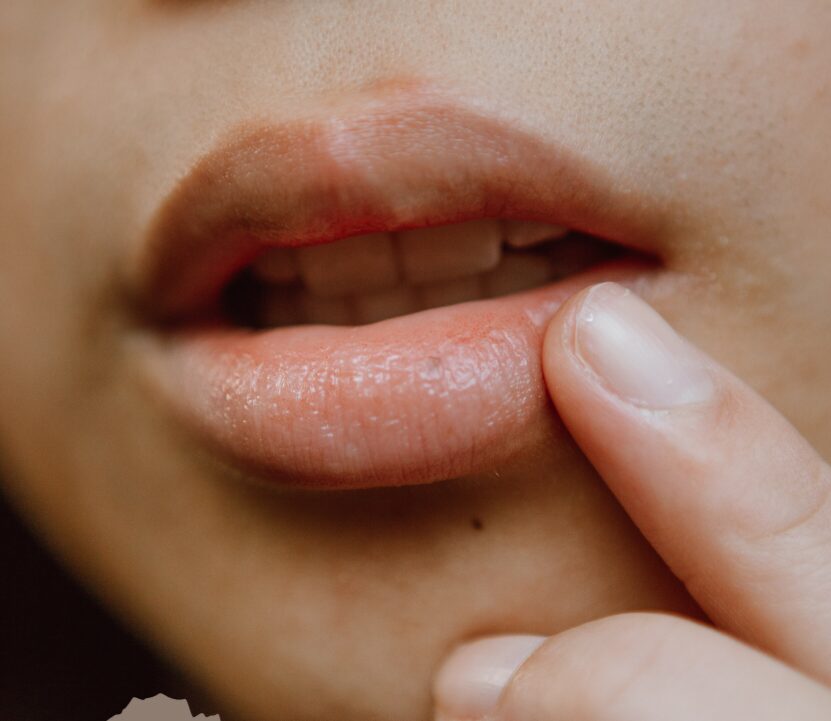
In this article
What is a Lip Pimple?
A pimple is a type of acne that forms when your pores become clogged with bacteria, dead skin cells, and oil. This can result in a small, tender bump on the skin, sometimes filled with pus. While acne can develop anywhere on the body, lip pimples are particularly common due to the high concentration of sebaceous glands around the mouth.
Symptoms of Lip Pimples
Lip pimples appear as tiny, sore, elevated spots on the skin around the lip or at the edges of the mouth. If filled with pus, these are called pustules, while pimples without pus are known as papules. These can cause discomfort, especially while eating.
Types of Acne on the Lips
Lip pimples can sometimes be mistaken for other types of acne, such as:
- Whiteheads: Small white bumps caused by clogged pores.
- Blackheads: Small black bumps caused by open clogged pores.
- Nodules: Hard, painful lumps under the skin without pus.
- Cysts: Painful lumps under the skin filled with pus.
What Causes Lip Pimples?
Pimples on the lips occur when pores get clogged with oil, dead skin cells, and bacteria, leading to inflammation. Common triggers include:
- Oil-based cosmetics or facial cleansers: These can clog pores.
- Diet: Foods high in sugar or fat can exacerbate acne.
- Hygiene: Not washing your face after sweating or using harsh soaps.
- Sun Exposure: Excessive sunlight can irritate the skin.
- Touching Your Face: This can transfer bacteria to your skin.
Risk Factors
Certain factors increase the likelihood of developing lip pimples:
- Genetics: Family history of acne.
- Medications: Drugs like lithium and corticosteroids.
- Hormonal Changes: Puberty, pregnancy, or menopause.
- Endocrine Disorders: Conditions like PCOS or diabetes.
- Stress: High stress levels can trigger acne.
- Age: Teenagers and young adults are more prone to acne.
Diagnosing Lip Pimples
Healthcare providers can usually diagnose lip pimples through a simple skin examination. If an infection is suspected, they might perform a bacteria culture test. It’s essential to differentiate between pimples and cold sores, as the latter are caused by the herpes simplex virus and require different treatment.
Effective Treatments for Lip Pimples
Treating lip pimples involves reducing inflammation and bacteria. Dermatologists might recommend:
- Home Remedies: Cold compresses to reduce swelling and pain.
- Topical Treatments: Creams or gels containing antibiotics, retinoic acid, benzoyl peroxide, salicylic acid, or sulfur.
- Oral Antibiotics: Medications like tetracycline or doxycycline.
- Hormonal Therapy: Oral contraceptives or spironolactone.
- Minor Procedures: Chemical peels, dermabrasion, or photodynamic therapy.
Preventing Lip Pimples
Maintaining a good skincare routine is key to preventing lip pimples:
- Cleanse Twice Daily: Use a gentle, alcohol-free cleanser.
- Avoid Harsh Products: Steer clear of astringents and exfoliants.
- Lifestyle Habits: Don’t touch your face frequently, use clean pillowcases, and ensure your makeup products are non-comedogenic.
Potential Complications
While generally harmless, improper handling of lip pimples can lead to complications such as:
- Infection: Popping or touching pimples can worsen infections.
- Scarring: Frequent picking can lead to scars.
- Mental Health Issues: Severe acne can impact self-esteem and lead to social withdrawal or depression.
Remedies and Tips
- Don’t Squeeze: Avoid popping pimples to prevent scarring.
- Warm Compress: Apply to help release pus from pimples.
- Benzoyl Peroxide and Salicylic Acid: Effective in reducing inflammation.
- Prescription Medication: Consider Retin-A or spironolactone for severe cases.
- Diet and Stress Management: Maintain a healthy diet and manage stress to reduce acne triggers.
The Takeaway
Lip pimples, though annoying, are manageable with proper care and treatment. By understanding their causes and implementing effective skincare routines, you can minimize their occurrence and maintain clear, healthy skin. If over-the-counter treatments don’t work, consult a dermatologist for more advanced options. Taking these steps can help you face the world confidently, without the worry of unexpected breakouts.
Encouragement to Act
Take charge of your skincare routine today. Implement these tips and see the difference they can make. If persistent acne continues to be a problem, don’t hesitate to seek professional help for a tailored treatment plan
A Quick Review
Lip pimples, often caused by clogged pores from oil, bacteria, or dead skin cells, can be uncomfortable and unsightly. This guide covers the causes, symptoms, and effective treatments for lip pimples, along with prevention tips to maintain clear and healthy skin. Learn how to differentiate between lip pimples and other types of acne and discover the best skincare practices to avoid future breakouts
Frequently asked questionsay
What causes pimples on the lip?
Pimples on the lip are typically caused by clogged pores due to oil, bacteria, or dead skin cells. Factors like using oil-based cosmetics, hormonal changes, and poor skincare can contribute.
How can I treat a pimple on my lip?
Treatment options include using topical creams with benzoyl peroxide or salicylic acid, applying warm compresses, and maintaining a gentle skincare routine. For persistent issues, consult a dermatologist.
Are lip pimples different from cold sores?
Yes, lip pimples form on the skin around the lips and are caused by clogged pores, while cold sores are viral infections that appear directly on the lips, causing painful blisters
Can diet affect lip pimples?
Yes, consuming greasy foods or dairy products can trigger acne in some people. Maintaining a balanced diet and observing how your skin reacts to certain foods can help manage breakouts.
How can I prevent pimples on my lip?
Prevent pimples by practicing good skincare, using non-comedogenic products, avoiding touching your face, and washing your face after sweating.











